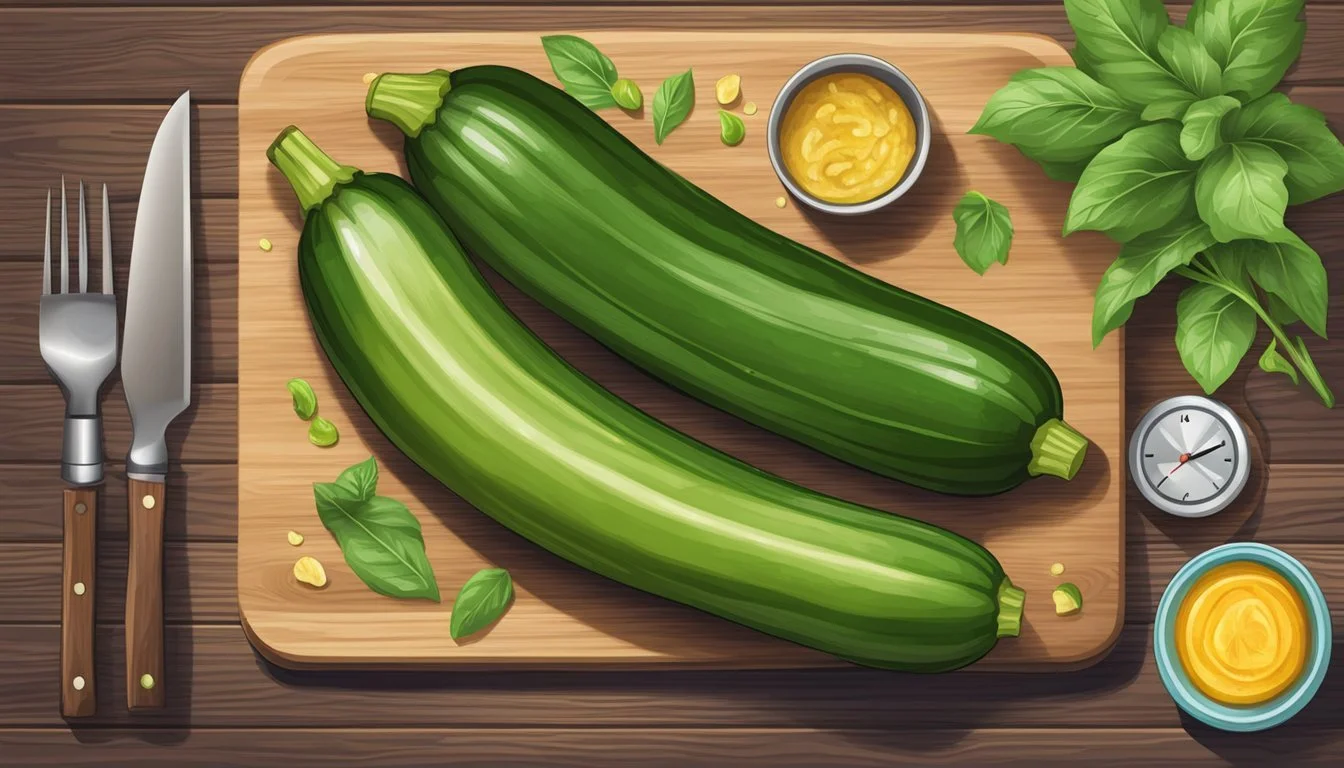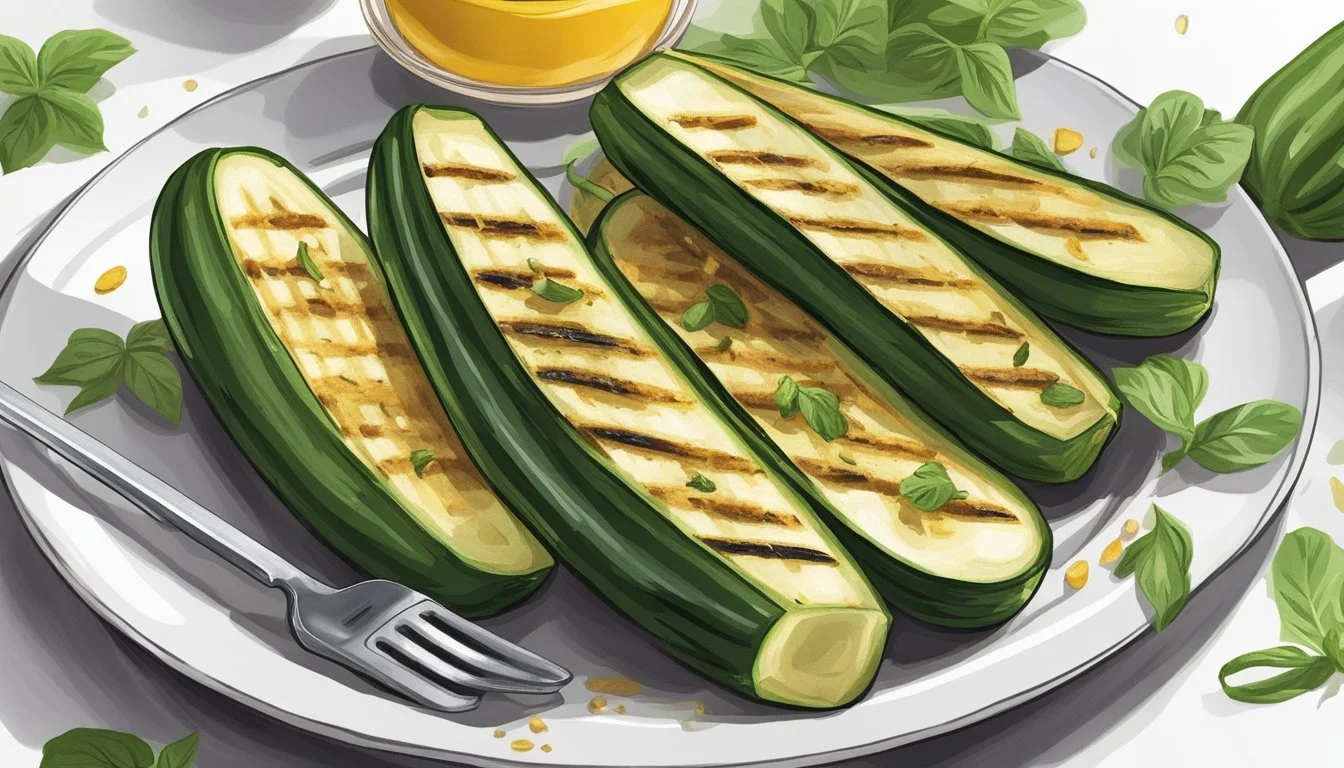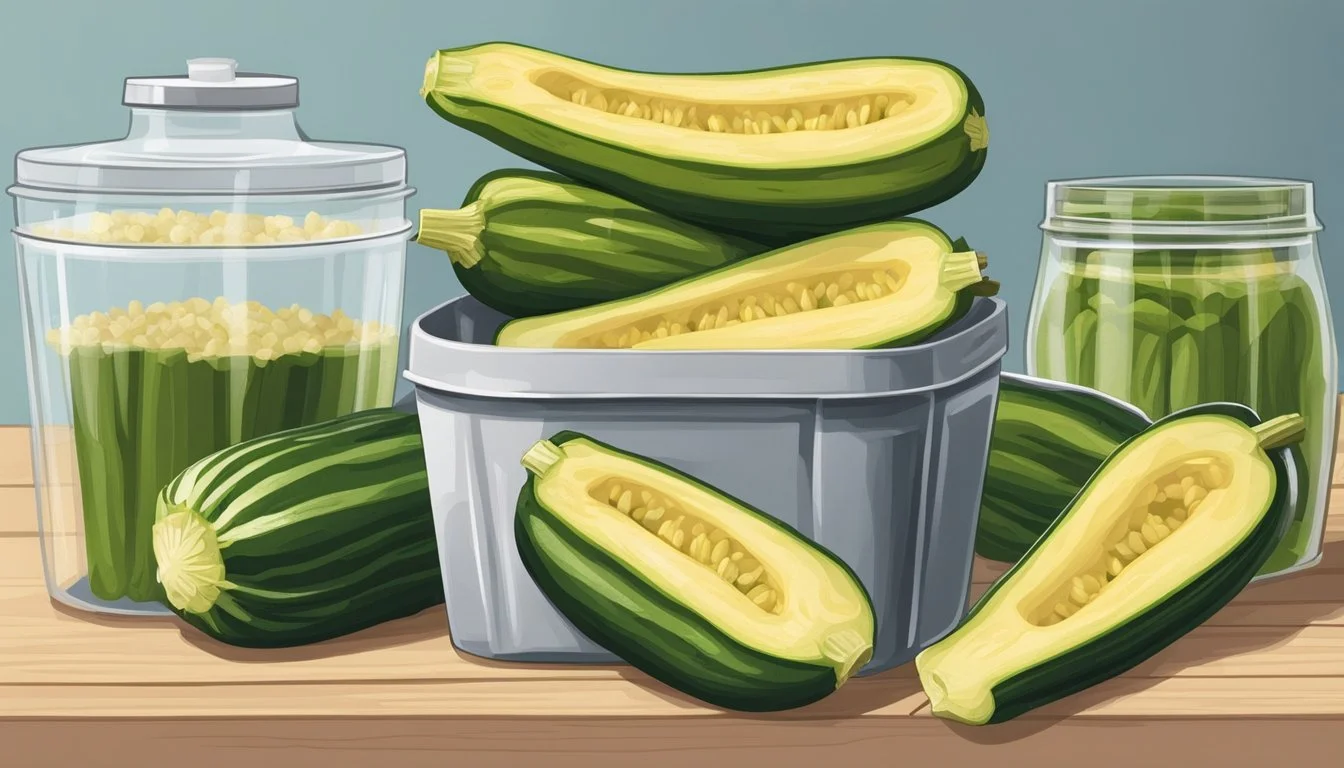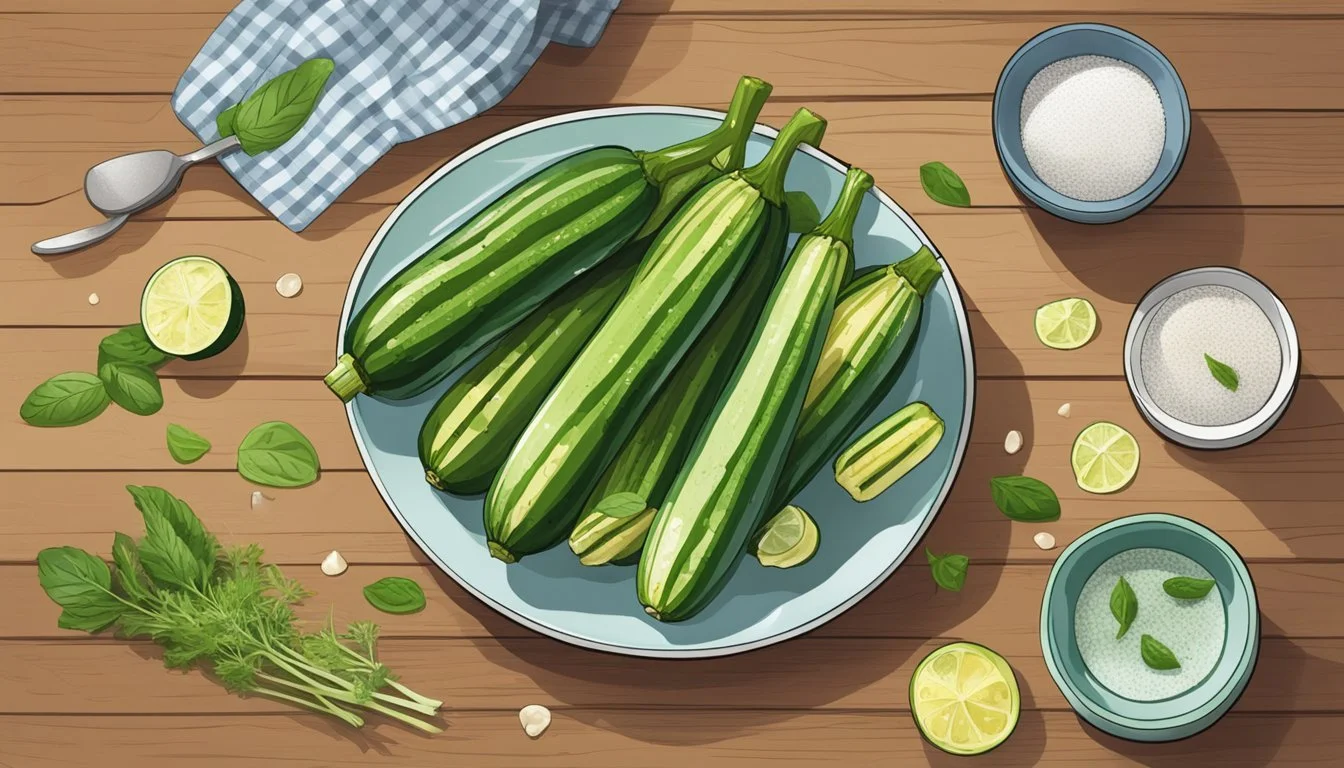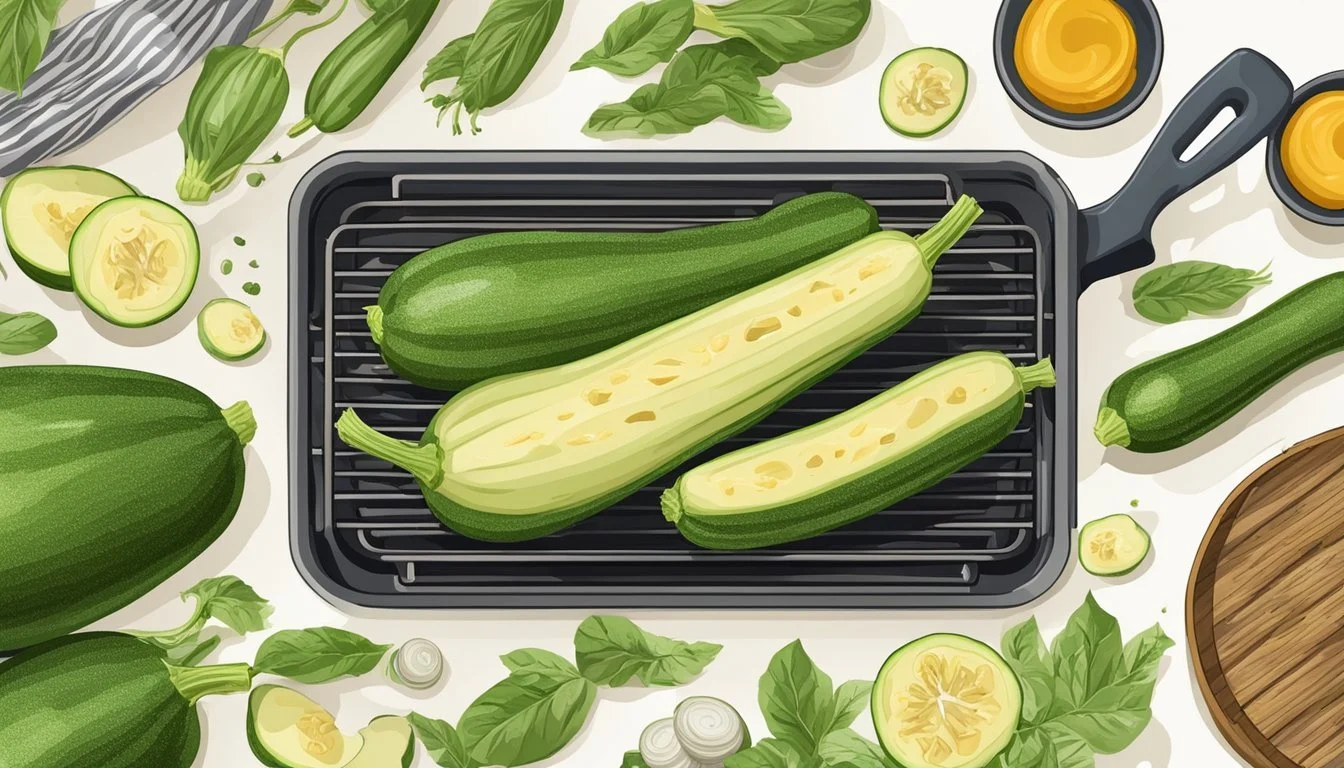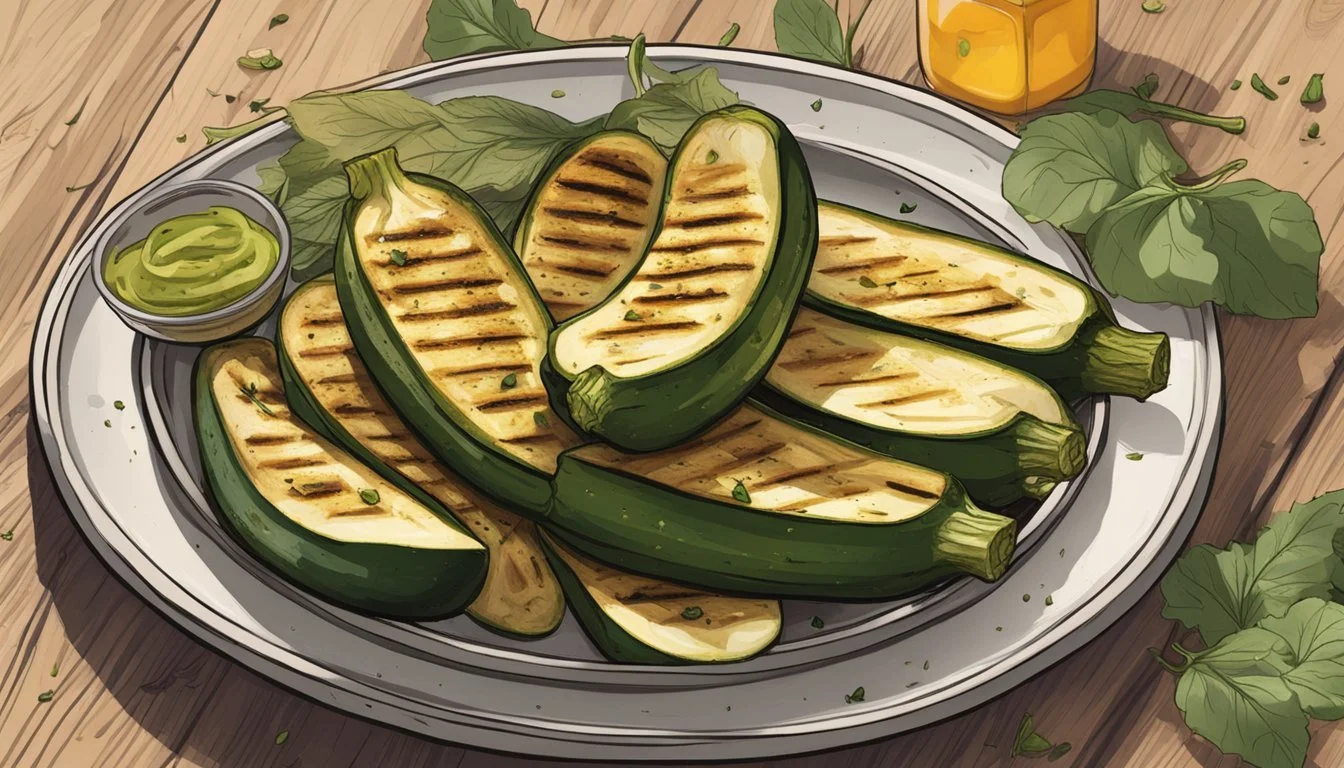How Long Does Gluten-Free Grilled Zucchini Last?
Storage Tips and Shelf Life
Grilled zucchini is a versatile and healthy dish that fits seamlessly into a gluten-free diet. Whether you're looking for a simple side dish or a main course, grilled zucchini is packed with nutrition and flavor. Properly stored, gluten-free grilled zucchini can last in the refrigerator for up to 3-4 days. This makes it an excellent meal prep option for busy individuals seeking nutritious and easily accessible meals throughout the week.
Grilled zucchini can be seasoned with a variety of herbs and spices, such as garlic, lemon juice, and Italian seasoning, to enhance its natural flavors. It's essential to ensure that your ingredients and cooking methods align with gluten-free guidelines, especially if you have celiac disease or gluten intolerance. Keeping the zucchini well-coated with olive oil and properly grilling them ensures a delicious and nutritious outcome.
Not only is grilled zucchini low in carbohydrates and gluten-free, but it's also rich in vitamins and minerals. With just a bit of preparation, you can enjoy this healthy dish and benefit from its nutritional value while enjoying the convenience of having pre-cooked veggies on hand. This makes it a perfect addition to any health-conscious meal plan.
Understanding Gluten-Free Grilled Zucchini
Grilled zucchini is a popular summer vegetable dish that fits seamlessly into gluten-free diets.
Zucchini, being naturally gluten-free, becomes an excellent candidate for various recipes. When grilled, it develops a smoky flavor and a tender yet firm texture. This cooking method is simple and quick, making it a convenient option for summer gatherings.
To prepare gluten-free grilled zucchini, start by slicing the zucchini lengthwise. Slices should be about 1/4 to 1/3 inch thick to prevent them from falling through the grill grates. Seasonings such as olive oil, garlic, salt, pepper, or a mix of herbs like basil and oregano can be used.
Marinating the zucchini for about 20 minutes enhances its flavor. Ensure it is coated evenly before placing it on the grill. Preheat the grill to medium-high heat, roughly around 450°F.
It is important to note that all ingredients used, including spices and oils, must be gluten-free to avoid any contamination.
Grilling should take about 4-5 minutes per side until grill marks appear.
Store leftover grilled zucchini in an airtight container in the refrigerator. It typically lasts for 3-5 days while retaining its texture and flavor.
Zucchini grilled this way can be served as a side dish or added to salads and sandwiches. Its versatility and ease of preparation make grilled zucchini a delightful and healthy gluten-free option for any meal.
Optimal Storage Conditions
Storing gluten-free grilled zucchini properly ensures its freshness and safety for consumption. Key factors include temperature control and the right type of container.
Refrigerator Storage
For best results, store gluten-free grilled zucchini in the refrigerator. Set the temperature between 40°F and 50°F (4°C and 10°C). Use an airtight container to prevent moisture loss and contamination from other foods.
Refrigerated grilled zucchini typically stays fresh for about 3 to 4 days. Ensure the zucchini is cool before placing it in the fridge. Rapid cooling prevents bacterial growth.
Freezer Tips
Freezing is another option to extend the shelf life of grilled zucchini. First, let the zucchini cool completely. Place the pieces in a single layer on a baking sheet and freeze until solid, about 1 to 2 hours.
After freezing, transfer the zucchini to a freezer-safe, airtight container or a heavy-duty freezer bag. Label the container with the date. Grilled zucchini can last in the freezer for up to 2 months.
Best Containers for Storage
Choosing the right container is crucial. Airtight containers or vacuum-sealed bags are optimal. They minimize air exposure and maintain the zucchini's texture and flavor.
For refrigerator storage, glass or BPA-free plastic containers are recommended. In the freezer, use durable, freezer-safe materials. Avoid flimsy containers that might crack or leak.
Proper storage techniques not only maintain the taste and nutritional value of the grilled zucchini, but also ensure it remains a healthy addition to meals.
Nutritional Profile
Grilled zucchini is not only delicious but also packed with essential nutrients. It offers a range of macro and micronutrients and is suitable for various dietary needs.
Macro and Micronutrients
Grilled zucchini provides a modest amount of calories, making it an excellent choice for those monitoring their intake. A large zucchini typically contains around 33 calories. It is high in carbohydrates and fiber, contributing over 3 grams of fiber per serving.
Protein content is also notable, with approximately 4 grams per large zucchini. While it is low in fat, the fat content can change depending on marination and cooking oils.
Micronutrient-wise, zucchini is rich in vitamin C and potassium. Vitamin C supports immune function, and potassium helps maintain healthy muscle and nerve function. Other minerals, like calcium, iron, and magnesium, are also present in smaller amounts.
Dietary Considerations
Grilled zucchini is versatile and meets various dietary restrictions. It is naturally gluten-free and can be prepared to fit low-carb, paleo, keto, and Whole30 diets. For added flavor without compromising dietary needs, simple seasonings like olive oil, salt, and herbs are ideal.
People with dairy restrictions can enjoy zucchini grilled without cheese or other dairy products. For those seeking vegan options, zucchini can be paired with plant-based ingredients.
Its nutrient density makes it a valuable addition to any balanced diet, providing essential vitamins and minerals while satisfying different dietary preferences.
Preparation and Cooking Guidelines
Preparing and grilling zucchini is a straightforward process that yields delicious results. Key steps include selecting fresh zucchini, prepping it correctly, and using proper grilling techniques to ensure optimal flavor and texture.
Selecting the Right Zucchini
Choose zucchini that are firm and free of blemishes. They should have a glossy, dark green skin. Smaller zucchini tend to be sweeter and more tender compared to larger ones. The ideal size is around 6-8 inches long and about 2 inches in diameter. Avoid zucchini that are overly soft or have wrinkled skin, which can indicate that they are overripe or starting to spoil.
Prepping Your Zucchini
Wash the zucchini thoroughly under cold running water to remove any dirt. Pat them dry with a clean towel. Slice off the ends and decide whether you prefer spears, planks, or rounds, adjusting the shape according to your grilling preference. Toss the zucchini in a mixture of olive oil, kosher salt, and black pepper to ensure even seasoning. Allow them to sit for a few minutes to absorb the flavors.
Mastering the Grill
Preheat the grill or grill pan to medium-high heat. Oil the grates lightly to prevent sticking. For zucchini planks, arrange them in a single layer and grill for 3-4 minutes per side, turning with tongs. For spears or rounds, grill for about 8-10 minutes, flipping halfway through. Aim for tender zucchini with distinct grill marks. Adjust the cook time based on the thickness of the slices, ensuring they do not become too soft.
Seasoning and Flavor Enhancers
Enhancing the flavor of gluten-free grilled zucchini involves selecting the right seasonings, creating marinades, and using fresh herbs to elevate the dish. These elements work together to provide a balanced taste and appealing aroma.
Choosing Your Seasonings
Seasonings are key in adding depth to grilled zucchini. Salt and black pepper form the basic seasoning mix. Adding garlic powder provides a subtle pungency, while Italian seasoning brings in a mix of herbs like oregano, basil, and thyme.
A sprinkle of chili flakes can introduce a mild heat, offering a different layer of flavor. When applying seasonings, ensure an even coating to achieve consistent taste throughout.
Creating Marinades
Marinades are essential for infusing flavors deeply into the zucchini. A simple yet effective marinade includes olive oil and lemon juice. The acidity of the lemon juice helps tenderize the zucchini, while olive oil ensures a rich, smooth texture.
Whisking in salt, black pepper, and Italian seasoning further enhances the marinade. Submerging zucchini in this mixture for at least 30 minutes allows the flavors to penetrate thoroughly, resulting in a more flavorful grilled dish.
The Role of Fresh Herbs
Fresh herbs can take the taste of grilled zucchini to another level. Basil and parsley are commonly used for their fresh and vibrant flavors. Adding these herbs just before serving preserves their brightness and prevents them from wilting.
Thyme and oregano can be included in the marinade or sprinkled over the zucchini during grilling. These herbs impart earthy, aromatic notes, balancing the zucchini’s mildness. Using a variety of herbs keeps the dish interesting and visually appealing.
Serving and Presentation Suggestions
Grilled zucchini is a versatile dish that can be enhanced with complementary side dishes and garnishes. Pairing it thoughtfully can elevate the meal experience.
Side Dish Pairings
Grilled zucchini pairs well with a variety of side dishes that enhance its flavors and textures. Classic choices include:
Grilled Chicken or Fish: Protein from chicken or fish complements the zucchini's fresh taste, creating a balanced meal.
Quinoa or Rice Pilaf: These grains add bulk and absorb the juices from the zucchini, contributing to a satisfying bite.
Cauliflower Rice: For a low-carb option, cauliflower rice offers a light, yet filling alternative that pairs seamlessly.
Fresh Salad: A mix of greens, cherry tomatoes, and cucumbers tossed in balsamic vinegar pairs nicely with the grilled flavors.
Garlic Bread: Adds a crunchy texture and complements the smoky flavor of the grilled zucchini.
Garnishes and Toppings
Enhancing grilled zucchini with the right garnishes can bring out its best qualities. Consider adding:
Parmesan Cheese: Freshly grated Parmesan adds a salty and savory dimension.
Lemon Zest: Brightens the dish with a hint of citrus without overpowering the zucchini's delicate taste.
Parsley: Fresh parsley provides a pop of color and a mild, refreshing flavor.
Balsamic Vinegar: A drizzle of balsamic vinegar adds a touch of sweetness and acidity that complements the grilled zucchini.
Pesto: Spoonfuls of pesto brings a rich, herbaceous note, pairing well with grilled flavors.
Toasted Nuts: Pine nuts or slivered almonds add a crunchy contrast to the soft texture of the zucchini.
Using a combination of these garnishes ensures an appetizing presentation and enhances the overall dining experience.
Special Diet Adaptations
Grilled zucchini can be adapted to meet various dietary needs, including low-carb, keto, vegan, vegetarian, paleo, and Whole30 diets. Each adaptation has specific ingredient considerations and preparation methods to ensure compliance with dietary guidelines.
Low-Carb and Keto Versions
For those following a low-carb or keto diet, grilled zucchini is an excellent choice due to its low carbohydrate content. To maximize the benefits, use olive oil or avocado oil for marinating, as these are both low in carbs and rich in healthy fats. Avoid any sugary marinades or sauces. Common seasonings include kosher salt, black pepper, and Italian seasoning. Always check the ingredient labels of any additional spices to ensure they do not contain hidden sugars or carbs. Grilling to a tender texture while avoiding overcooking helps maintain the zucchini’s nutrient profile.
Vegan and Vegetarian Adaptations
Grilled zucchini easily fits into vegan and vegetarian diets. The key is to use plant-based oils like olive oil and to avoid any animal products in seasoning mixtures. For enhancing flavor, spices such as garlic powder, oregano, and smoked paprika are ideal. Nutritional yeast can be added for a cheesy flavor without dairy. Additional toppings like chopped fresh herbs, nuts, or seeds can be sprinkled on top for extra texture and nutrition. These adaptations ensure the dish remains within vegan and vegetarian guidelines while offering rich flavors and health benefits.
Paleo and Whole30 Insights
To adapt grilled zucchini for paleo and Whole30 diets, focus on clean, simple ingredients. Both diets discourage processed foods and emphasize natural ingredients. Olive oil or coconut oil is recommended for grilling. Season with salt, pepper, and herbs like thyme or rosemary, avoiding any spice blends that may contain sugar or additives. Vinegar can be included but should be compliant with diet standards—such as apple cider vinegar for paleo or balsamic vinegar for Whole30. These adaptations highlight whole, unprocessed foods and align with the dietary guidelines of both paleo and Whole30 without sacrificing flavor or variety.
Safety and Food Handling
When grilling gluten-free zucchini, it is critical to avoid cross-contamination. Designate separate areas of the grill for gluten-free foods, ensuring they never come into contact with gluten-containing items.
Use tinfoil or dedicated grill baskets to create a barrier. This helps maintain the integrity of gluten-free items and prevents any gluten particles from contaminating the zucchini.
Ensure that all utensils, plates, and cutting boards are thoroughly cleaned before use. Using dedicated tools for gluten-free cooking significantly reduces the risk of cross-contamination.
Inspect sauces and marinades for gluten-free certification. Even trace amounts of gluten from these products can affect those with gluten sensitivity or Celiac disease.
Store grilled zucchini in an airtight container in the refrigerator. Proper storage ensures it remains safe to eat for up to 3-4 days. Label containers to differentiate between gluten-free and gluten-containing foods.
Always wash hands thoroughly before handling food and after touching any gluten products. Maintaining good hygiene practices is essential in preventing cross-contamination.
Regularly clean the grill grates. Any remnants from previous use could cause cross-contact. For added safety, dedicating a grill or specific grates for gluten-free cooking might be beneficial.
Following these guidelines will help ensure safe and enjoyable meals for those on a gluten-free diet.
Variations and Alternative Recipes
For those interested in exploring different takes on gluten-free grilled zucchini, there are numerous variations that draw from international cuisines and innovative stuffing options that make use of zucchini's versatility.
International Flavors
Grilled zucchini can be easily adapted to incorporate flavors from various global cuisines. Mediterranean-inspired dishes often include ingredients like feta cheese, olive oil, lemon juice, and fresh herbs such as oregano and thyme. A simple yet delicious option is grilling zucchini spears and serving them with a sprinkle of feta and a squeeze of lemon.
For an Asian twist, think about using soy sauce (or tamari for a gluten-free option), sesame oil, and ginger. These ingredients can be used to create a marinade that infuses the zucchini with bold, umami-rich flavors.
Mexican-style grilled zucchini may incorporate spices like cumin, chili powder, and lime juice. This combination can give your zucchini a zesty kick. Adding a bit of cilantro and cotija cheese on top can enhance its authenticity and flavor.
Stuffed Zucchini Options
Stuffed zucchini boats offer a creative way to enjoy this vegetable. These boats can be filled with various ingredients to suit different dietary preferences.
For those who love Italian cuisine, a bolognese-stuffed zucchini boat could be a satisfying option. Filling zucchini boats with a rich meat sauce and topping them with grated parmesan transforms the dish into a comforting meal.
Vegetarians might prefer a mixture of quinoa, black beans, corn, and cheese. This combination not only adds flavor but also boosts the dish's nutritional content.
For a lighter option, a stuffing of cherry tomatoes, mozzarella balls, and basil can be quite refreshing. Drizzling with balsamic glaze can elevate the taste.
Experimenting with different fillings and flavors allows for endless possibilities, forming a versatile base for whatever cuisine or dietary requirement.
Maximizing Leftovers
Proper storage and creative repurposing can help extend the life of gluten-free grilled zucchini and transform it into new, delicious meals.
Reheating Strategies
To keep your grilled zucchini from becoming soggy, reheat it in the oven at 350°F (175°C) for about 10 minutes. This helps maintain its texture. For a quicker option, use an air fryer at 375°F (190°C) for 5 minutes. Avoid microwaving as it can make the zucchini mushy.
When reheating, ensure the zucchini reaches an internal temperature of 165°F (74°C) to guarantee safety. Use a meat thermometer for accuracy. Store leftovers in an airtight container to retain moisture and prevent spoilage for up to 3-4 days in the refrigerator.
New Dish Creations
Leftover grilled zucchini can enhance a variety of dishes. Chop it up and add it to pasta salads, providing a burst of smoky flavor. For a heartier meal, mix it into quiches or frittatas. It’s also a great filling for sandwiches or wraps.
For quick snacks or meals, layer it on burgers or toss it into stir-fries. Elevate your salads by adding diced grilled zucchini for extra texture and flavor. Lasagna and tacos also benefit from the addition of this versatile veg. The key is creativity—mix and match to keep meals exciting.

